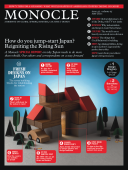
Issue 43
In Monocle’s new issue, we focus on the rebuilding of Japan and ask whether this could be an opportunity to make the country even better than before.
In This Issue
Oops! No content was found.
Looks like we no longer have content for the page you're on. Perhaps try a search?
Return Home

